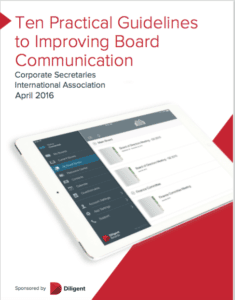 Mark Twain once said: “I didn’t have time to write you a short letter, so I wrote a long one instead”. As corporate secretaries, we regularly face this challenge in relation to board communication: management prefers bombarding directors with as much information as possible to avoid being accused of opacity, whilst directors often complain that they are receiving too much information and it is being presented to them in ways that don’t highlight the key issues in order to stimulate the requisite discussion and debate, leading to less transparency and neither party’s objectives really being achieved.
Mark Twain once said: “I didn’t have time to write you a short letter, so I wrote a long one instead”. As corporate secretaries, we regularly face this challenge in relation to board communication: management prefers bombarding directors with as much information as possible to avoid being accused of opacity, whilst directors often complain that they are receiving too much information and it is being presented to them in ways that don’t highlight the key issues in order to stimulate the requisite discussion and debate, leading to less transparency and neither party’s objectives really being achieved.
Ensuring effective board communication has always been a critical aspect of the role of the corporate secretary, but even more so in the face of ever-increasing liability for directors. The business judgement rule has been incorporated into legislation in many jurisdictions. The ability to depend on this rule is impacted by the actual information shared with directors, as well as the quality of their discussions and debate (based on such information provided) in reaching a decision in the best interests of the company. In addition, the increased usage of electronic communication has introduced many opportunities for better and instant communication, but at the same has increased the risk of overload.
Download the full report here: 10 Practical Guidelines to Improve Board Communication.
More from Diligent:
An Intro to Board Portals–Make Good Governance Easier
Leadership in Crisis: Tapping the collective strength of the CEO & Board
The Evolution of Corporate Governance
This article was submitted by our partners at Diligent Corporation. Diligent is the leading provider of secure corporate governance and collaboration solutions for boards and senior executives. For more information visit Diligent.com




